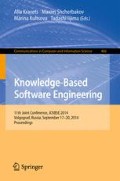Abstract
Skill gap analysis is one of the most important problems in learning management. Using the computerized adaptive testing provides the effective way to solve this problem and allows adapting the test to the examinee’s ability level. This paper presents an adaptive testing model that integrates hierarchy of knowledge and skills of subject domain and difficulty of the test items. This combination of testing features allows using the presented model for criterion-referenced testing. The following algorithms on the base of adaptive testing model have been developed: starting point selection, item selection, test termination criterion, skill gap assessment. Implementation of these algorithms in the learning management system allows testing the student’s knowledge and skills in specific subject domain purposefully and consider the different ability levels. Developed adaptive testing model and algorithms are applied for testing the basic knowledge and skill gaps in subject domain of variables declaration in C programming language.
Access this chapter
Tax calculation will be finalised at checkout
Purchases are for personal use only
Preview
Unable to display preview. Download preview PDF.
References
Thissen, D., Mislevy, R.J.: Testing Algorithms. In: Wainer, H. (ed.) Computerized Adaptive Testing: A Primer. Lawrence Erlbaum Associates, Mahwah (2000)
Ortigosa, A., Paredes, P., Rodriguez, P.: AH-questionnaire: An adaptive hierarchical questionnaire for learning styles. Computers & Education 54(4), 999–1005 (2010)
Van Der Maas, H.L.J., Wagenmakers, E.-J.: A Psychometric Analysis of Chess Expertise. The American Journal of Psychology 118, 29–60 (2005)
Klinkenberg, S., Straatemeier, M., Van der Maas, H.L.J.: Computer adaptive practice of Maths ability using a new item response model for on the fly ability and difficulty estimation. Computers & Education 57(2), 1813–1824 (2011)
Stark, S., Chernyshenko, O.S., Drasgow, F., White, L.A.: Adaptive Testing With Multidimensional Pairwise Preference Items Improving the Efficiency of Personality and Other Noncognitive Assessments. Organizational Research Methods 15(3), 463–487 (2012)
Papanastasiou, E.: Computer-adaptive testing in science education. In: Proc. of the 6th Int. Conf. on Computer Based Learning in Science, pp. 965–971 (2003)
Van der Linden, W.J., Glas, C.A.W.: Computerized Adaptive Testing: Theory and Practice. Kluwer Academic Publishers, Netherlands (2000)
Huang, S.X.: A Content-Balanced Adaptive Testing Algorithm for Computer-Based Training Systems. In: Lesgold, A.M., Frasson, C., Gauthier, G. (eds.) ITS 1996. LNCS, vol. 1086, pp. 306–314. Springer, Heidelberg (1996)
Van der Linden, W., Hambleton, R.: Handbook of Modern Item Response Theory. Springer, New York (1997)
Baker, F.: The Basics of Item Response Theory. ERIC Clearinghouse on Assessment and Evaluation, University of Maryland, College Park, MD (2001)
McCalla, G.I., Greer, J.E.: Granularity-Based Reasoning and Belief Revision in Student Models. In: Greer, J.E., McCalla, G. (eds.) Student Modeling: The Key to Individualized Knowledge-Based Instruction, vol. 125, pp. 39–62. Springer (1994)
Kumar, A.N.: Using Enhanced Concept Map for Student Modeling in Programming Tutors. In: FLAIRS Conference, pp. 527–532. AAAI Press (2006)
Anohina, A., Graudina, V., Grundspenkis, J.: Using Concept Maps in Adaptive Knowledge Assessment. In: Advances in Information Systems Development, pp. 469–479 (2007)
Guzmán, E., Conejo, R.: Simultaneous evaluation of multiple topics in SIETTE. In: Cerri, S.A., Gouardéres, G., Paraguaçu, F. (eds.) ITS 2002. LNCS, vol. 2363, pp. 739–748. Springer, Heidelberg (2002)
Guzmán, E., Conejo, R.: A Model for Student Knowledge Diagnosis Through Adaptive Testing. In: Lester, J.C., Vicari, R.M., Paraguaçu, F. (eds.) ITS 2004. LNCS, vol. 3220, pp. 12–21. Springer, Heidelberg (2004)
Dang, H.F., Kamaev, V.A., Shabalina, O.A.: Sreda razrabotki algoritmov adaptivnogo testirovanija. Informatizacija i Svjaz’ 2, 107–110 (2013)
Moodle - Open-source learning platform, https://moodle.org/
Author information
Authors and Affiliations
Editor information
Editors and Affiliations
Rights and permissions
Copyright information
© 2014 Springer International Publishing Switzerland
About this paper
Cite this paper
Litovkin, D., Zhukova, I., Kultsova, M., Sadovnikova, N., Dvoryankin, A. (2014). Adaptive Testing Model and Algorithms for Learning Management System. In: Kravets, A., Shcherbakov, M., Kultsova, M., Iijima, T. (eds) Knowledge-Based Software Engineering. JCKBSE 2014. Communications in Computer and Information Science, vol 466. Springer, Cham. https://doi.org/10.1007/978-3-319-11854-3_9
Download citation
DOI: https://doi.org/10.1007/978-3-319-11854-3_9
Publisher Name: Springer, Cham
Print ISBN: 978-3-319-11853-6
Online ISBN: 978-3-319-11854-3
eBook Packages: Computer ScienceComputer Science (R0)

